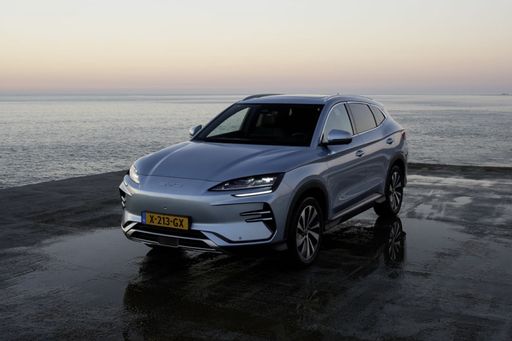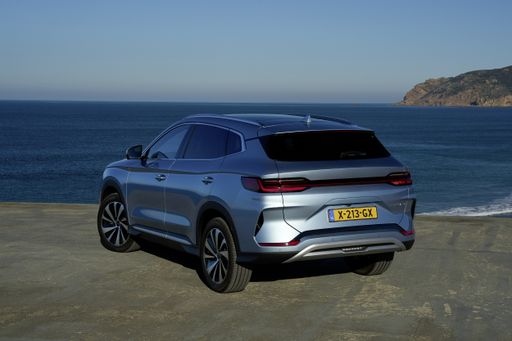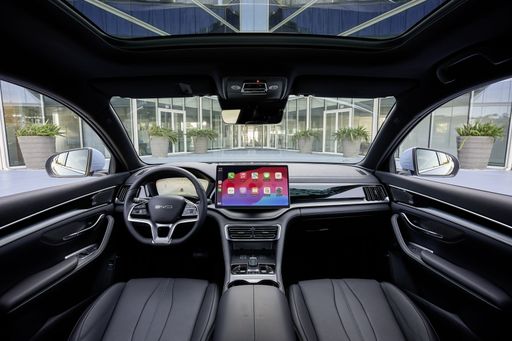BYD Seal U VS Hyundai Tucson
In the automotive showdown between the BYD Seal U and the Hyundai Tucson, both models showcase impressive features tailored to different driving preferences. The BYD Seal U offers a sleek, all-electric design with a focus on sustainability and cutting-edge technology, while the Hyundai Tucson impresses with its versatile fuel options and spacious interior. Ultimately, the choice between these two vehicles hinges on whether buyers prioritize eco-friendly performance or a well-rounded SUV experience.
BYD Seal U
The BYD Seal U presents itself as a sophisticated addition to the electric vehicle market, blending sleek design with cutting-edge technology. Its modern aesthetic is complemented by a spacious interior, offering both comfort and functionality for drivers and passengers alike. With advanced features prioritising sustainability and performance, it represents a bold step forward in eco-friendly motoring.
detailsHyundai Tucson
The Hyundai Tucson is a standout choice in the compact SUV segment, offering a perfect blend of style, comfort, and practicality. Its modern design is complemented by a spacious interior that provides ample room for passengers and luggage alike. With advanced technology and safety features, the Tucson ensures a smooth and enjoyable driving experience.
detailsBYD Seal U vs Hyundai Tucson: A Comprehensive Comparison
The automotive market is continuously evolving, with manufacturers delivering innovative solutions that cater to diverse preferences and environmental concerns. Among the latest entrants in the SUV arena are the BYD Seal U and the Hyundai Tucson. Both vehicles present exciting options in the growing segment of electrified and hybrid technology. This article examines the technical aspects and innovations of these two models, providing potential buyers with valuable insights.
Design and Dimensions
The BYD Seal U measures 4775 mm in length, 1890 mm wide, and stands at 1670 mm tall, offering a bold and modern appearance. Its five-door body type maximizes passenger and cargo space, featuring a trunk capacity that ranges from 425 to 552 liters, depending on the variant. In comparison, the Hyundai Tucson is slightly shorter, stretching between 4510 mm to 4520 mm in length, with a width of 1865 mm and a height of 1650 mm. Its trunk capacity also impresses, providing up to 620 liters of storage space, making it a practical choice for families and adventurers alike.
Powertrain and Performance
Under the hood, the BYD Seal U is equipped with either a plugin hybrid or a fully electric powertrain, delivering an output that ranges from 218 to 324 HP. The electric variant boasts a remarkable acceleration from 0 to 100 km/h in just 5.9 seconds, demonstrating its sporty edge. The Seal U offers impressive efficiency, with a consumption rate of only 0.9 L/100 km (in hybrid mode) and an electric range of up to 500 km.
On the flip side, the Hyundai Tucson provides multiple engine choices, including petrol, diesel, full hybrid, and plugin hybrid options, producing power between 136 HP to 252 HP. The Tucson's hybrid variants also feature competitive acceleration times, with the quickest reaching 100 km/h in just 7.9 seconds. Its fuel economy is commendable, with consumption figures tailored to the engine type, ranging up to 6.8 L/100 km in certain configurations.
Driving Dynamics
Both vehicles feature advanced transmission systems designed for smooth driving experiences. The BYD Seal U employs a Continuously Variable Transmission (CVT) and a reduction gearbox for efficient power delivery, available in both Front-Wheel Drive (FWD) and All-Wheel Drive (AWD) configurations. The Tucson, on the other hand, offers a diverse lineup including automatic double-clutch transmissions and manual options, ensuring adaptability across different driving conditions.
Safety and Technology Innovations
In terms of safety and technology, both the BYD Seal U and Hyundai Tucson feature a range of cutting-edge advancements. The Seal U showcases BYD's intelligent driving assistance systems, enhancing road safety and convenience. Similarly, the Tucson is equipped with Hyundai's SmartSense technology, which includes advanced driver-assistance systems that help mitigate accidents and enhance the driving experience.
Interior technology in both vehicles is competitive. The BYD Seal U features an intuitive infotainment system with high-resolution displays and connectivity options, ensuring drivers stay connected on the go. The Tucson equally impresses with its user-friendly interface, advanced navigation systems, and integrated smartphone connectivity, fostering an engaging driver experience.
Environmental Responsibility
As eco-conscious choices become increasingly important to consumers, both models take environmental responsibility seriously. The BYD Seal U stands out with a CO2 emission rating of 0 g/km in its electric variant, promoting a sustainable way of driving. The Hyundai Tucson, while slightly higher with emissions ranging from 126 g/km to 153 g/km depending on the variant, still offers efficient hybrid options that align with greener initiatives.
Conclusion
In this head-to-head comparison, both the BYD Seal U and Hyundai Tucson present compelling features that cater to today's diverse automotive landscape. The Seal U shines with its electric capabilities, quick acceleration, and exceptional range, while the Tucson offers versatility with multiple engine choices and practical storage solutions. Ultimately, the choice between these two SUVs may come down to specific needs, preferences, and the importance of electrification versus traditional engines in the modern driving experience.
 @ press.bydauto.be
@ press.bydauto.be
 @ press.bydauto.be
@ press.bydauto.be
 @ press.bydauto.be
@ press.bydauto.be
 @ hyundai.news
@ hyundai.news
 @ hyundai.news
@ hyundai.news
 @ hyundai.news
@ hyundai.news
 @ hyundai.news
@ hyundai.news
 @ hyundai.news
@ hyundai.news

|

|
|
|
|
Costs and Consumption |
|
|---|---|
|
Price
about 33300 - 38600
£
|
Price
about 30000 - 46300
£
|
|
Consumption L/100km
0.9 - 1.2
L
|
Consumption L/100km
1 - 6.8
L
|
|
Consumption kWh/100km
19.9 - 20.5
kWh
|
Consumption kWh/100km
-
|
|
Electric Range
70 - 500
km
|
Electric Range
65 - 70
km
|
|
Battery Capacity
-
|
Battery Capacity
-
|
|
co2
20, 0, 26
g/km
|
co2
22 - 153
g/km
|
|
Fuel tank capacity
60
L
|
Fuel tank capacity
42 - 54
L
|
Dimensions and Body |
|
|
Body Type
SUV
|
Body Type
SUV
|
|
Seats
5
|
Seats
5
|
|
Doors
5
|
Doors
5
|
|
Curb weight
1940 - 2147
kg
|
Curb weight
1520 - 1889
kg
|
|
Trunk capacity
425 - 552
L
|
Trunk capacity
546 - 620
L
|
|
Length
4775 - 4785
mm
|
Length
4510 - 4520
mm
|
|
Width
1890
mm
|
Width
1865
mm
|
|
Height
1668 - 1670
mm
|
Height
1650
mm
|
|
Payload
410
kg
|
Payload
525 - 545
kg
|
Engine and Performance |
|
|
Engine Type
Plugin Hybrid, Electric
|
Engine Type
Diesel MHEV, Petrol MHEV, Petrol, Full Hybrid, Plugin Hybrid
|
|
Transmission
Automatic
|
Transmission
Automatic, Manuel
|
|
Transmission Detail
CVT, Reduction Gearbox
|
Transmission Detail
Automat. Schaltgetriebe (Doppelkupplung), Manual Gearbox, Automatic Gearbox
|
|
Drive Type
Front-Wheel Drive, All-Wheel Drive
|
Drive Type
Front-Wheel Drive, All-Wheel Drive
|
|
Power HP
218 - 324
HP
|
Power HP
136 - 252
HP
|
|
Acceleration 0-100km/h
5.9 - 9.6
s
|
Acceleration 0-100km/h
7.9 - 11.6
s
|
|
Max Speed
170 - 180
km/h
|
Max Speed
180 - 194
km/h
|
|
Torque
300 - 550
Nm
|
Torque
265 - 367
Nm
|
|
Number of Cylinders
4
|
Number of Cylinders
4
|
|
Power kW
160 - 238
kW
|
Power kW
100 - 185
kW
|
|
Engine capacity
1497 - 1498
cm3
|
Engine capacity
1598
cm3
|
|
Top speed
170 - 180
km/h
|
Top speed
180 - 194
km/h
|
General |
|
|
Model Year
2024
|
Model Year
2024
|
|
CO2 Efficiency Class
B, A
|
CO2 Efficiency Class
D, E, B
|
|
Brand
BYD
|
Brand
Hyundai
|
BYD Seal U
An Introduction to the BYD Seal U
The BYD Seal U is a groundbreaking entrant in the automotive market, serving as a testament to the brand's commitment to innovative sustainable mobility solutions. Designed as an eco-friendly SUV, the Seal U is available in both Plug-In Hybrid and fully Electric variants, providing consumers with choices that align with their driving habits and environmental concerns.
Innovative Powertrains and Performance
At the heart of the BYD Seal U lies its forward-thinking powertrains. The Plug-In Hybrid model combines a finely tuned 1497 - 1498 cm³, 4-cylinder engine with an electric motor to deliver a total power output of up to 324 PS. The hybrid system is capable of achieving a frugal 0.9 - 1.2 litres per 100 km fuel consumption, though it does not compromise on performance with an impressive acceleration from 0 to 100 km/h in 5.9 - 9.6 seconds.
In the fully Electric variant, the Seal U boasts a substantial performance with up to 238 kW of power, ensuring a brisk ride while providing a clean and silent driving experience. With two battery options offering ranges from 420 km to an expansive 500 km, this electric SUV proves to be a formidable contender for those who prioritise long-distance electric mobility.
State-of-the-Art Design and Comfort
The Seal U's design embodies a sophisticated blend of style and function. Its commanding SUV silhouette, measuring between 4775 - 4785 mm in length, conveys both elegance and robustness. Inside, the vehicle offers room for five passengers, ensuring comfort with plush seating and a spacious interior that's accentuated by advanced ergonomic design and quality materials.
The boot space ranges from 425 to 552 litres, accommodating the demands of family trips or sizable grocery hauls with ease. In terms of technology, the Seal U does not disappoint, featuring an intuitive infotainment system that connects seamlessly with mobile devices, ensuring entertainment and connectivity on the go.
Advanced Safety Features
Safety is paramount for BYD, and the Seal U incorporates a suite of advanced safety technologies to protect its passengers. Systems such as adaptive cruise control, lane-keeping assist, and automatic emergency braking work in concert to enhance the driving experience while providing peace of mind. These features are complemented by a robust body structure designed to absorb and dissipate impact energy efficiently.
Environmentally Conscious Engineering
The BYD Seal U sets a new standard in eco-friendly automotive design. Its Plug-In Hybrid and Electric models both earn impressive CO2 efficiency ratings, ranging from class A to B, thanks to technologies that significantly reduce emissions. Additionally, its Plug-In Hybrid system enables an all-electric range up to 80 km, allowing for short day-to-day trips purely on electric power and making it an ideal choice for environmentally conscious drivers.
Pricing and Model Year
The BYD Seal U is accessible to a wide range of budgets with prices beginning at €38,900 and extending to €44,990, depending on specifications and chosen trim levels such as Boost CVT, Comfort, Design, and Design AWD CVT. As we look to the future, the 2024 model year is poised to continue BYD's tradition of excellence, bringing advanced engineering and sustainable practices to drivers eager for innovation and efficiency.
Hyundai Tucson
Introducing the Hyundai Tucson: An SUV with Innovation at its Core
The Hyundai Tucson has long been synonymous with reliability, comfort, and exceptional value. With its 2024 model, this popular SUV has taken a bold leap forward by incorporating cutting-edge technology, efficient powertrains, and striking design. Let's delve into the technical details and innovations that make the Hyundai Tucson a standout in the crowded SUV market.
Dynamic Engine Options: Power Meets Efficiency
The Tucson offers a range of powertrains, ensuring there is a model perfect for every driver. Whether you're looking for the fuel efficiency of a mild-hybrid diesel or the power of a plug-in hybrid, the Tucson has you covered. The engine options include:
- Diesel Mild-Hybrid: Combining efficiency with robust performance.
- Benzin Mild-Hybrid: Offering a balance between economy and power.
- Voll-Hybrid: Delivering impressive power while maintaining low fuel consumption.
- Plug-in Hybrid: Offering electric-only driving capabilities with a range of up to 65 km.
These engines are paired with either a manual or automatic transmission, catering to different driving preferences.
Performance and Handling: Experience the Drive
The performance of the Hyundai Tucson is designed to impress, with power outputs ranging from 136 to 252 PS. The Tucson accelerates from 0-100 km/h in as little as 8.1 seconds, managed by precise transmission options such as the dual-clutch and traditional automatic gearboxes. With both front-wheel and all-wheel drive options, the Tucson assures stability and control in varied driving conditions.
Interior and Technology: Comfort Meets Cutting-Edge Innovation
The Tucson's interior is a haven of comfort and technology. With a length ranging up to 4520 mm and a spacious boot capacity of 620 litres, practicality is at the forefront. The intuitive infotainment system includes advanced connectivity features, while driver-assist technologies enhance safety and convenience on every journey.
The choice of luxurious trims and finishes, combined with ergonomic design, ensures that every drive is a pleasure, whether you're on a daily commute or an extended adventure.
Environmental Considerations: Efficiency and Sustainability
Hyundai has made notable strides in ensuring that the Tucson is as environmentally friendly as possible. Models with CO2 emissions as low as 27 g/km place it amongst the leaders in its class for eco-friendly driving. The array of hybrid options further complements Hyundai's commitment to sustainability, providing consumers with green alternatives without compromising performance.
Conclusion: The Hyundai Tucson Is More Than Just an SUV
The 2024 Hyundai Tucson is more than just a means of transport—it's a statement of modernity. It reflects Hyundai's dedication to innovation, efficiency, and comfort, all wrapped up in a stylish and versatile SUV. Whether you're tech-savvy, eco-conscious, or performance-oriented, the Tucson proves to be an ideal choice for forward-thinking drivers.
